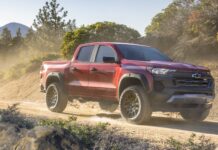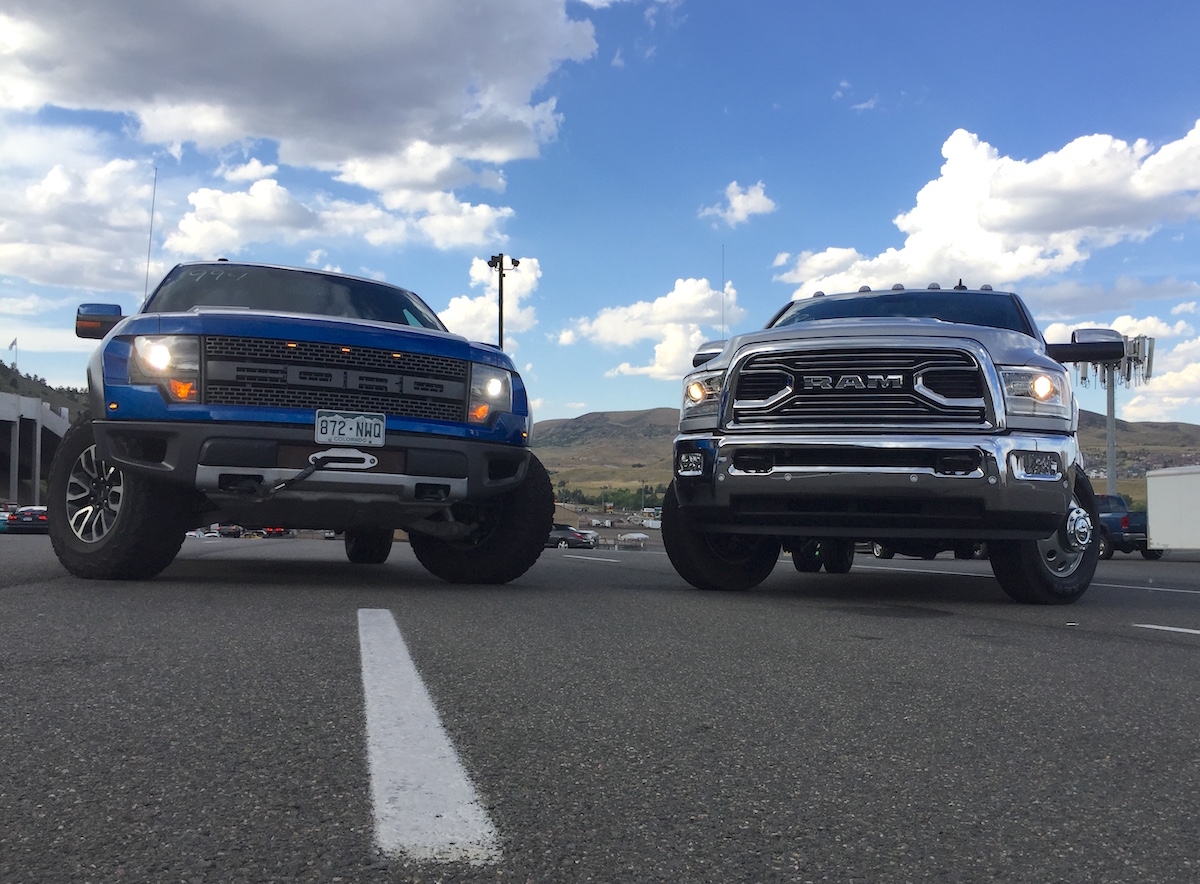
In this Ask TFL, we’re digging into the recently revealed 2023 Chevrolet Colorado.
It’s been a relatively quiet couple years in the midsize truck segment, but the game is starting to heat up once again. Beyond the revamped Nissan Frontier, there’s a new Ford Ranger and Toyota Tacoma in the pipeline. Then there’s the big news of the moment: the 2023 Chevrolet Colorado. There’s plenty of hype as the truck market continues to glow red hot — even in the face of supply chain issues, delayed production and record high transaction prices.
Enter TFLtruck reader and friend Dave, a 2019 Colorado Bison owner who reached out with his excitement about looking into an upgrade. However, after the initial excitement, he has some concerns and provided a wealth of context we wanted to dive into with an “Ask TFL” segment.
Here is the situation in his words (everything between the separating lines is Dave’s message, with extra headings to make it easier to take in):
“Last week, when Chevrolet announced the 2023 Colorado, I was about as excited as one can be for a remake of a vehicle I already really like. I have a 2019 Colorado Bison. I watched TFL and eagerly scoured other online video content and automotive websites. It really looked like a solid home run at the time.
A week later, now that I’ve dug further into the specifications, I’m growing increasingly concerned and I’ve gotten a bad case of cold feet…
My two major concerns are the massive weight gain of the 2023 model over the 2022 and that four-cylinder engine. If there’s a 2023 Colorado Bison and it has that same 2.7L engine, I just don’t think I would trade my 2019 Bison in for it, despite all the wonderful improvements to the vehicle, and there are many.

Looking at the new Colorado by the numbers
Per Chevrolet’s media site, the 2022 Colorado ZR2 V-6’s curb weight is 4,715 pounds. For some reason that I can’t fathom, the 2022 ZR2 2.8L Duramax is listed as 4,977lbs (262 pounds more). The estimated curb weight for the 2023 ZR2 is 5,298 pounds.
That’s 583 pounds more than the old V-6 ZR2…Five. Hundred. Eighty. Three. That’s a massive, massive weight gain. I’d say it’s basically unprecedented in vehicles, almost like there wasn’t a weight budget for the 2023. Then consider the Colorado Bison. For 2022, it’s 239 pounds more than the ZR2. So if you reasonably expect a 2023 Bison (if there is one) to weigh in equally heavier, it would be a hefty 5,537 pounds…That’s full-size truck weight.
I think that up until recently, the weight of a truck was immaterial — they are trucks after all. But alas, that just isn’t the case for an off-road truck, especially these days when fuel economy is at a premium.

About the engine…
I strongly suspect that the 2023 Colorado in WT, LT, Trail Boss, and ZR2 aren’t not too far from the 2022 Silverado in terms of weight. What that means to me is that I can find many online reviews of various crew cab short bed Silverados with the 2.7L engine, and use that as a basis to measure for how the 2023 Colorado will perform.
And therein lies the rub. I haven’t run into many reviews of the 2.7L where the tester/reviewer is raving about that engine. Nearly each one acknowledges the 2.7L’s capabilities, but most are followed by the caveat, ‘for a four-cylinder’. In other words, the performance is surprisingly good ‘for a four-cylinder’. It can really tow ‘for a four-cylinder. Zero to 60 is fairly amazing…you get the picture.
Worse yet was the near universal dismay at the meager gas savings: 1 mpg over a V-8. The comments were along the lines, ‘I can understand and agree with a four-cylinder for gas savings, especially one with good tow capacity, but the savings just aren’t there’. ‘A V8 is only 1 mpg penalty.’
In some cases, if I remember correctly, the 5.3L V8 got better gas mileage…
So, for me, I don’t think the value proposition will be there.
If this motor were generating an honest 24, 25, 26 mpg then I think I could rationalize the four-cylinder. But I can’t.
Worse (for me) is the unsettling feeling of a marketing team is playing me for a chump. The 2.7L is now the base, economy motor for the Silverado. However, in the Colorado, there are two detuned versions. It’s like the someone or some group directed the motor to be detuned 2 levels to try to make the base motor in the Silverado (or the Colorado ZR2) seem like a better, higher performance motor. Sort of like your ISP putting out slower-speed Internet services, without really changing the speed of their ‘old’ offering to make that option seem like it’s new and lightning fast. Is this a marketing trick?

Let me return to the reviews of the 2022 Silverado 2.7L.
I didn’t see many smiles or hoorahs or giddy, boyish delight in 2.7L reviews. Mostly it was a resigned, reserved, perhaps dejected, ‘well I guess this is what we’ve come to’ attitude. You could see the pained look on the faces of reviewers who smashed the throttle only to hear an appliance-like four-cylinder motor.
Contrast to reviews of the 6.2L V-8 Silverado. Miles of smiles, drivers wide-eyed and laughing. The sound of the V-8? American as apple pie, baseball and — you guessed it — Chevrolet. Bottom line, most consumers (not the people who have to make a living with their truck) buy for what they think they need, or what they want for the fictitious ‘needs’ they imagine.
I’m no different.
Four-cylinder motors have a terrible stigma and this long stroke, low revving turbo-four may not change people’s minds, especially in the 2023 Chevrolet Colorado ZR2.
Now, I’m not so dejected to heap unwarranted criticism on GM. The effort to bring that new four-cylinder to the market and design, engineer, test, tweak, etc. is a remarkable feat that only large companies like GM can manage. For many customers, especially fleet managers, getting another 1-2 mpg is a welcome accomplishment. But pushing a relatively lightweight, 2WD full-sized (or midsized) work/fleet pickup truck around town is one thing. Having it in a 5,300-pound (or possibly more with a Bison) Colorado ZR2? I can’t imagine it will be very impressive.
I love my 2019 Colorado Bison. It puts a smile on my face each time I get in and fire it up. Life’s too short (at my age anyway) for an off-road sport truck that doesn’t tickle all the senses and stoke my passion for living.
I’m too old to settle for ‘not that bad for a four-cylinder.'”

TFL’s feedback (and upcoming podcast!)
First off, huge thanks to Dave for his support and providing so much detail to chew on with the decision to upgrade to the new Colorado (or not). The whole team enjoyed off-roading with the ZR2 Bison, so it’s understandable why Dave is thinking hard about whether to swap it for the brand-new Colorado.
On the whole, vehicles do tend to get physically larger and heavier with each generation. The 2023 Chevy Colorado is obviously no exception, and Andre does get into the nuts-and-bolts questions of this new truck in the latest TFL Talkin’ Trucks podcast (available Friday, 8/5 at 7 AM EST). While the quarter ton shift in this new generation is significant on paper, we will have to reserve judgement on just how detrimental that could be until we actually have a chance to drive it.
The same goes for fuel economy
As it stands, the new Colorado would likely need to clear at least 2-3 mpg better than the outgoing 3.6L V-6 models. The non-ZR2 truck manages 19 mpg combined, while the ZR2 manages 17 mpg, according to EPA figures. We won’t have official ratings for the new truck for some time yet, but automakers usually don’t backslide on fuel economy with next-generation models. Usually. My hunch (and to be clear, this is absolutely a hunch) is that the new Colorado will split the difference somewhere between the old 3.6L gas engine and the 2.8L Duramax turbodiesel. More or less, I think we’ll see something to the effect of diesel-like torque with better emissions and slightly better economy than the old V-6.
As for the ‘wow’ factor, again we can’t yet put together a proper critique until we actually drive the new Colorado. GM, like every other automaker, has to thread that needle of acknowledging the need to move toward more efficient, less environmentally damaging powertrains without completely gutting that ‘smiles for miles’ feeling that good-old V-8s provide. It’s a tough nut to crack, as is the case with the fiery debate around electric trucks like the F-150 Lightning and forthcoming Chevy Silverado EV, among others.
Disappointing though my approach may be, we just need a bit more real-world perspective before conclusively saying that the cold feet are justified, or whether everything’s going to be hunky-dory.
Let us know your thoughts below!
















![Which is More Reliable: 3.5L EcoBoost or 5.0L V8? [Reader Question] Second-generation 3.5-liter EcoBoost engine](https://tfltruck.com/wp-content/uploads/2016/05/Second-generation-35-liter-EcoBoost-engine.jpg)
![Which Silverado Engine to Get: 5.3L or 6.2L V8? [Ask TFLTruck] 2016 chevy silverado](https://tfltruck.com/wp-content/uploads/2015/10/2016-chevy-silverado-grille.jpg)
